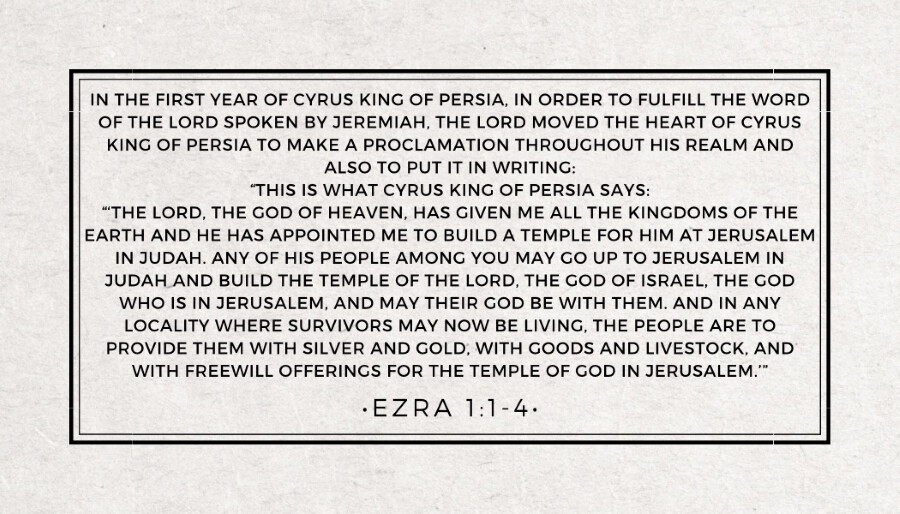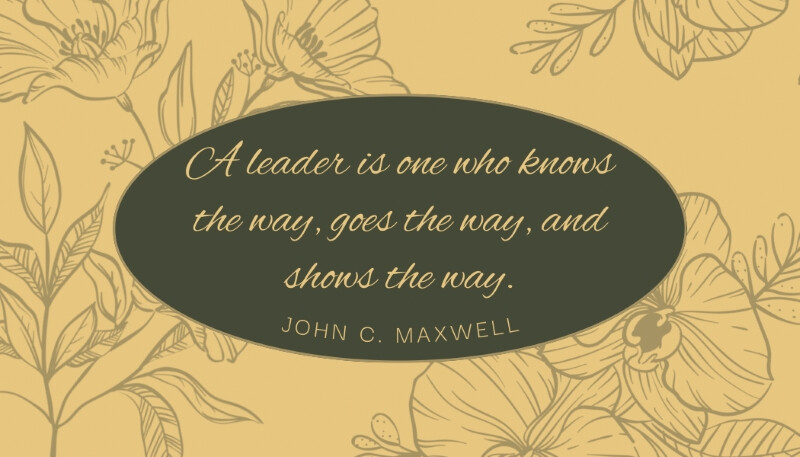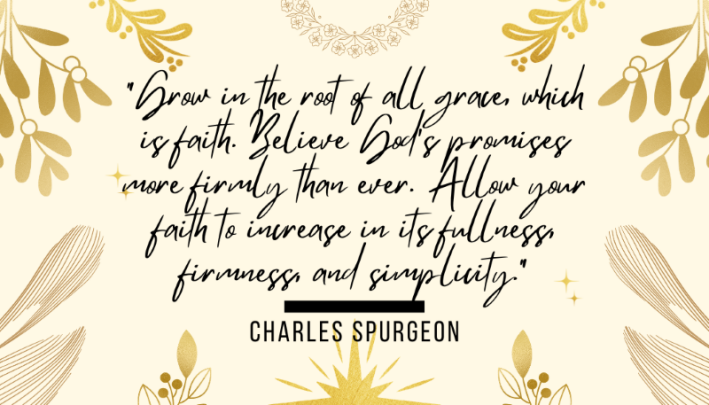Today we will go through another timeless story and its teachings found within the pages of Scripture, by exploring the fascinating story of Ezra, a figure whose unwavering faith and dedication played a pivotal role in the restoration of Israel. To get a better understanding of Ezra's story, let us first set the stage with some historical background.
During ancient times, the Israelites experienced a tumultuous period marked by exile and displacement. In 586 BCE, Jerusalem was conquered by the Babylonians, and many Israelites were taken captive. This period, known as the Babylonian exile, lasted for several decades, leaving behind a devastated land and scattered people. However, the tide would eventually turn, as the Persian Empire, under the rule of King Cyrus, conquered Babylon and issued a decree allowing the exiled Israelites to return to their homeland. It was within this historical backdrop that Ezra emerged as a key figure.
Ezra, a scribe and priest, lived during the 5th century BCE. His mission was not only to lead a group of returning exiles back to Jerusalem but also to reestablish their religious practices and restore their faith in God. Ezra's story is one of recovery, both physically and spiritually. Through Ezra's journey, we will uncover valuable lessons and insights that can inspire us in our faith journeys today.
Getting a Little Deeper into the Exile and Return
The mighty Babylonian empire, under King Nebuchadnezzar II, conquered Jerusalem and destroyed the Holy Temple. All of the people of Judah were forcibly taken into captivity and deported to Babylon. This period of exile lasted for about seventy years, during which the Israelites longed for their homeland, ceaselessly hoping to return to their ‘real lives.’
The exile proved to be more than a physical displacement, as the endless challenges the Israelites faced impacted them spiritually and emotionally too. Stripped of their land, their temple, and their autonomy, they found themselves living as outsiders. They were separated from their religious practices, cultural traditions, and even their language. Internal and external isolation accompanied the separation, forcing them to question their identity and faith as they struggled to navigate living among others from conflicting cultures, unsure how they fit within the new beliefs and customs.
Grappling with feelings of despair and alienation, the Israelites fiercely clung to the promises of God, accepting that their exile was a byproduct of their disobedience but also trusting in God's faithfulness to fulfill His covenant. The writings and insights of prophets such as Jeremiah and Ezekiel served as a source of hope by providing comfort and assurance that they were God’s chosen people. They faithfully believed that God would provide. As a consequence of renewing their faith and commitment to God and his commandments, a collective and weighty need to revive their faith and reconnect with their spiritual heritage emerged in their hearts, fueling their determination to return to Jerusalem.
It was in this context of longing that the Persian Empire conquered Babylon. King Cyrus provided a glimmer of hope and issued a decree allowing the exiles to return to Jerusalem.

Despite the daunting task of regaining their identity as a chosen people, the unwavering desire to rebuild their lives, reclaim their land, live under the rule of their own leaders, and reassemble their temple sparked strong-willed perseverance that propelled many of the Israelites forward as they embarked on the arduous journey back to their homeland.
In total, 42,360 Israelites returned to their native land. Regardless of their enthusiasm to rebuild the temple, they were met with roadblocks and adversity. It wasn’t until a couple of decades after their arrival in Jerusalem that the construction of the temple had been completed.
Enter Ezra
Ezra arose as a central figure in the story of Israel's post-exilic era. His commitment to the study and teaching of God's laws, as well as his unwavering dedication to re-establishing religious practices, catapulted his active involvement in guiding the exiled Israelites back to a place of spiritual revival.
As a scribe and priest, Ezra had a long history of diligently studying the ancient texts and meticulously preserving the Scriptures. His expertise and understanding of the Law were unparalleled, making him a trusted authority on matters of faith. His deep reverence for the Scriptures and his commitment to upholding its teachings set him apart as a faithful servant of God.
But it didn’t stop there, for Ezra's passion for God’s word surpassed personal devotion. He recognized that the restoration of Israel was not just about the physical rebuilding of the temple, but also encompassed the spiritual rejuvenation of the people. Ezra reflected upon his commitment to the study of God's laws, along with his ability to interpret and apply them. He felt a profound responsibility to pass on this knowledge to the people of Israel, ensuring that they understood and lived in accordance with God's commandments. Ezra knew what he had to do.
Allowing himself to be a vessel for God, Ezra set in motion a plan that would position him as a powerful example and teacher among the people in Israel. He reached out to King Artaxerxes, outlining his mission to lead a second expedition of exiles to Jerusalem. Ezra’s request is met with favor. Not only does Artaxerxes authorize Ezra’s petition, he generously provides Ezra with funding for the necessary supplies to aid in worship in the temple, tax exemption, and judicial power.

When he arrived in Jerusalem, he was prepared to dive right in and get to work. Presumably, Ezra had an inkling that the Israelites needed his guidance and preaching, after all, by the time of his arrival more than half a century had passed since the first group of exiles had made the trek from Babylon to Jerusalem. Yet, when he arrived, he immediately received devastating news. He was informed that many of the Israelites, including priests and leaders, had once again fallen into the sticky temptation of sin by intermarrying with others who were not a part of God’s chosen people. This was a direct violation of God’s commandments.
The implications of the matter shook Ezra to his core. Intermarriage was far more than marrying someone from a different culture, for the Israelites, it was a careless misdeed that allowed the influence of pagan gods to muddle and tarnish God’s chosen people. Ezra was overwhelmed with disbelief by the fact that Israelites would repay God for His mercy and grace, for His works that permitted them to return to the promised land, in the form of active disobedience. Distraught, Ezra fell to his knees and prayed. Shame coated every word as he openly cried out, confessing the sins of God’s chosen. A group of Israelites gathered around him. As they watched, their hearts were stirred by Ezra’s raw emotion. Guilt and disgust angrily flowed through them, and they decided to take a stand and right their wrongs.
Ezra tirelessly went to work. He took decisive and uncompromising action. He gathered the community and called them to repent and separate from their foreign wives. He appointed judges in every town of Jerusalem who were instructed to investigate each case of intermarriage. His commitment to upholding God's laws led to a difficult but necessary process of eradicating these marriages, emphasizing the importance of prioritizing God above all else.

Ezra continued to educate and encourage the Israelites to follow God’s instructions. A gifted speaker, he facilitated private and public readings of the Scriptures, prudently conveying the teachings and principles with clarity. His fervor and conviction enabled him to properly implement the fine details of long-neglected religious practices into the community. Together, the Israelites purged nefarious practices, sanctified themselves, and recommitted to living in obedience to the law. Their shared commitment to God's commandments was not merely a ceremonial act; it completely rejuvenated their relationship with God and allowed them to fully embrace their identity as the chosen people of God. Ezra’s efforts and influence successfully reshaped the Israelites' spiritual identity, communal responsibility, and sense of purpose.
To Conclude
As we conclude this exploration of Ezra's inspiring story, we are reminded of the timeless relevance and lessons it holds for us today. Ezra's story is a testament to the profound strength and diligence of an individual who is deeply rooted in God's Word and committed to its teachings. His example challenges us to embrace a similar dedication to the study and application of Scripture in our own lives. Like Ezra, we can aspire to be faithful stewards of God's word, sharing its wisdom and truths with others, and actively pursuing a life that reflects the beauty and guidance found within its pages.
In a world filled with distractions and temptations, Ezra's example encourages us to prioritize our relationship with God and to remain steadfast in upholding His commandments. Ezra's commitment to upholding God's laws and his resolve to address challenging issues mirror his deep understanding of the importance of obedience and faithfulness. His leadership exemplifies the willingness to make difficult decisions for the sake of spiritual integrity and the restoration of God's people. It reminds us of the need for moral courage, unwavering faith, and a resolute determination to confront spiritual challenges we face in our own lives head-on that may hinder our relationship with God; allowing God's truth and principles to guide our actions and decisions, even when it be uncomfortable or unpopular. We need to anchor ourselves in God’s word.
Ezra’s leadership qualities illustrate how we can uplift and strengthen others. His example highlights the far-reaching impact that his vision, organization, and dedication to the well-being of the community had, causing a collective journey toward renewal. Just as the Israelites found strength and inspiration in their unity, we too can draw from the support and encouragement of fellow believers. Ezra’s efforts to reform faith within the community exemplifies our calling for us to actively invest in the well-being of our fellow believers, encourage one another, and build strong, supportive communities. Through example and worship, we utilize our own spheres of influence, fostering unity, and supporting one another on our faith journeys.
As we apply the lessons from Ezra's story to our own lives, let us not merely be spectators of this remarkable account but active participants in our own lives and faith journeys. Let us be catalysts of transformation, seeking to rebuild and restore areas that may have been neglected or broken. Let us actively engage in the restoration of faith and community, fostering genuine connections and supporting one another in our spiritual growth. May Ezra's story continue to inspire and guide us, enabling us to become agents of restoration, faith, and community in our own unique contexts. Let us embark on this journey with renewed fervor and trust, knowing that God's faithfulness and guidance are with us every step of the way.

- Torrance Church of Christ














